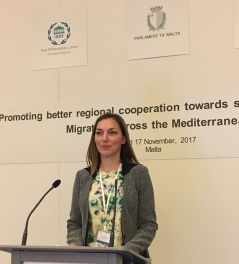Aleksandra Maletic, member of the National Assembly delegation and Vice-President of the Parliamentary Assembly of the Mediterranean, is a panellist at the Conference on “Promoting better regional cooperation towards smart and humane migration across the Mediterranean”, on 16 and 17 November 2017 on Malta.
The panellists said that the huge migration flows across the Mediterranean exert enormous pressure on the receiving, transit and origin countries. It is up to the parliaments and their members to play a key role in this: to pass suitable laws, make sure that effective policies for a just, smart and humane migration management be drafted and implemented and ensure public support for these measures.
The aim of the Conference, co-organized by the Inter-Parliamentary Union and the Parliamentary Assembly of the Mediterranean, is to bring together parliamentarians from the region to seek common responses to the challenges concerning migration and develop a parliamentary perspective for the talks on the global compact on Safe, Orderly and Regular Migration to be held in the United Nations between February and July 2018.
Maletic presented Serbia’s efforts to ensure a humane treatment of the migrants and the efforts it puts into strengthening regional cooperation and its institutional framework to better support safe and orderly migration and human rights. She stressed that the Serbian institutions reacted to the refugee crisis promptly and flexibly, according to the highest international standards, in cooperation with international organizations.
The member of the Serbian delegation to PAM informed the Conference attendees that about 920 thousand registered refugees and migrants had gone through Serbia since the beginning of the crisis, however, though after the Western Balkan route was closed the numbers had dwindled, at the same time the migrants began to stay longer in Serbia which presents challenges of a different kind.
Maletic said that Serbia had set up 18 centres with the capacity to house 7,000 people and provide them with food, clothes and healthcare, wherein children and unaccompanied minors receive special care. She said that Serbia treats vulnerable groups such as women and children with special care, mentioning that about 7000 children had integrated into elementary schools, and 500 teachers were trained to work with them.
The politicians, academicians, experts, businesspeople, humanitarian and civil society organizations from around the world attending the Conference are discussing a series of current issues through the migrant perspective.
Finally, Maletic said that Serbia views the migrations as a matter of abiding by international norms of solidarity and humaneness, that it had done its best to meet the needs of the refugees and migrants despite its own economic challenges, stressing that the policy to resolve this global challenge must be comprehensive and sustainable and that Serbia would fully support such a policy.




